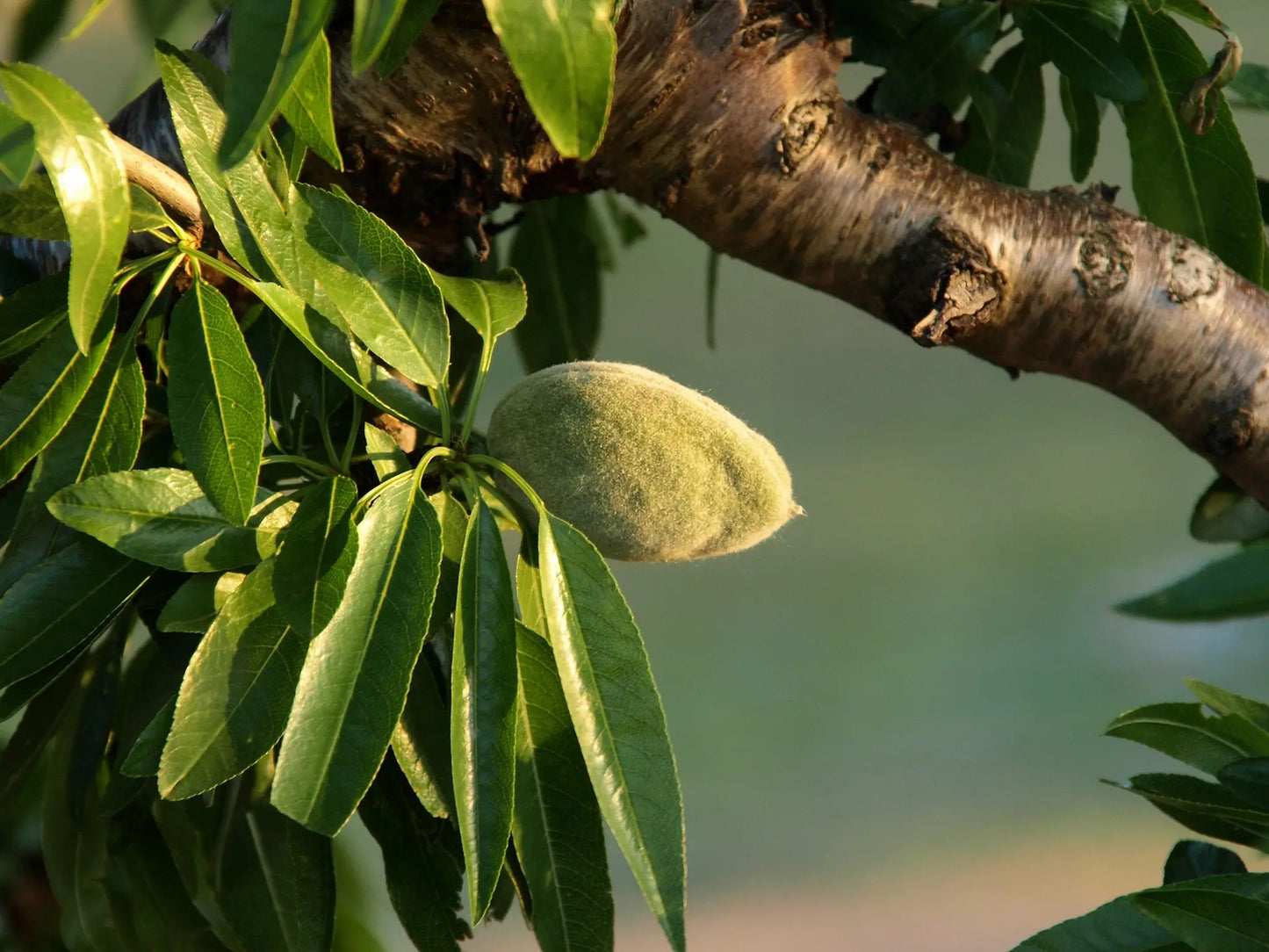-
Delivery from 10 plants to France, Switzerland and Europe
Delivery method -
Almond Tree Wholesale Supplier
About Us -
Quality Almond Tree Plants
Technical itinerary
Almond Tree Plant Aï Half-Stem diameter 6-8 cm bare-root conventional
Almond Tree Plant Aï Half-Stem diameter 6-8 cm bare-root conventional
The prices shown are our base prices for large volumes. Depending on the quantity ordered and the producers’ pricing scales, the rate may be adjusted upward. Each quote is personalized to ensure you receive a fair price.
Mini order 10 units / Multiple orders 10 units (FRS202412002)
Couldn't load pickup availability
 Buy now and get it delivered when you're ready to plant - Add your desired date to your quote request
Buy now and get it delivered when you're ready to plant - Add your desired date to your quote request
- Delivery from 10 plants to France, Switzerland and Europe

Collapsible content
FAQ: Planting Tips
You can find all our planting advice for almond trees in France here.
Almond tree - How do I harvest my almonds properly?
Almond tree - How to manage irrigation in France?
Almond tree - What markets for treated almonds?
Almond tree - How to pollinate the almond tree?
Almond Tree - How to Prevent Almond Tree Frost?
Almond Tree - How to ensure good drainage for almond trees?
Almond Tree - How to prepare the soil for 1 hectare of almond trees?
Almond Tree - Which organic fertilizers should you choose for almond trees?
Almond Tree - Annual Work Calendar for the Almond Tree
Planting your almond tree plot: how to do it? What maintenance is required?
Technical sheet of the Aï Almond variety
- Fruit skin color: Green, dry when ripe
- Size and shape: Oblong-compressed drupes, usually between 25 and 40 mm in length
- Fruit maturity: September
- Fruit Taste: Sweet and meaty
- Earliness of the variety: Late flowering
- Fruiting period: Fresh almonds are harvested in June-July, while dried almonds are harvested in August-September, sometimes in October
- Disease resistance and storage: Susceptible to scab, resistant to fungal diseases such as monilia. Almonds can be stored for 9 to 12 months at room temperature, but can be stored for up to two years under optimal conditions (temperature below 5°C and humidity below 65%).
- Variety yield: Very productive
- Is this variety self-fertile? No, it requires the presence of another almond variety such as Texas or Ardéchoise almonds for good pollination and optimal fruiting.
- Commercial Use: Almonds can be eaten raw, used in baking, or even for making alcohol.
- Is this a COV variety? No
- Comments: Traditionally grown in Provence, France, since the 19th century. Likes sun and light, dry, and slightly chalky soils. Avoid heavy, wet soils. The 'Aï' almond tree blooms late, which protects it from frost.
Quick read / the essentials on the Aï Almond Tree
The Aï almond tree is a traditional Provençal variety, cultivated in France since the 19th century. Appreciated for its sweet and fleshy almonds, it is distinguished by its late production cycle and exceptional longevity. This variety is ideal for direct consumption as well as for agri-food processing into confectionery and pastries. Its adaptation to the conditions of southern France makes it a popular choice for almond growers wishing to optimize their yield while preserving a local variety.
If you are looking to buy Aï Almond plants , it is essential to contact a specialist almond plant wholesaler to ensure the quality and productivity of your orchard. The Aï Almond tree produces oblong fruits whose hard shell protects a sweet almond, particularly appreciated for the production of calissons, nougats and other derivative products. Its conservation is optimal for up to two years in a cool, low-humidity environment.
Native to Provence, this variety tolerates dry, light, and chalky soils well. Its spreading habit and longevity of 50 to 100 years make it a sustainable investment for almond growers. Late flowering, in March, reduces the risk of spring frosts, and harvests range from June-July for fresh almonds to August-October for dried almonds.
For optimal production, the Aï almond tree requires the presence of pollinating varieties such as Texas, Ferraduel or Ferragnès . Recommended rootstocks include the Franc almond tree , ideal for well-drained soils, as well as GF 677 , which is more tolerant of wet and calcareous soils.
To ensure the proper development of your orchards, choose a wholesale supplier specializing in almond plants . Buying Aï almond plants from an expert guarantees you efficient, high-quality production, perfectly suited to the requirements of the French market.
Presentation of the Aï Almond Tree
The Aï almond tree is a traditional Provençal variety, cultivated in France since the 19th century. Renowned for the taste quality of its sweet and fleshy almonds , it is used in the production of almonds for direct consumption, confectionery and food processing. Its late production cycle and longevity make it an interesting choice for almond growers looking for a variety adapted to the conditions of the south of France.
Fruit characteristics
The fruits of the Ai almond tree are oblong, compressed drupes , measuring between 25 and 40 mm in length . When ripe, the green skin dries and splits , revealing a hard shell containing the almond. The flesh, although present at the beginning of development, disappears when the dried almonds are harvested.
Ai almonds are known for their sweet taste and fleshy texture . They are ideal for raw consumption, baking, and making derivative products such as calissons or certain almond-based alcoholic drinks.
In terms of conservation, they can be stored for between 9 and 12 months at room temperature and up to two years in optimal conditions (temperature below 5°C and humidity below 65%).
Origin and adaptation to French conditions
The Aï almond tree is a local Provençal variety , historically cultivated in France for its resistance to southern climatic conditions and its superior taste qualities. It appreciates light, dry and slightly chalky soils and tolerates heat and sunshine well, although it is necessary to avoid soils that are too heavy and humid.
Tree characteristics
The longevity of the Ai almond tree is one of its major assets. It can live for more than 100 years , although an average lifespan of 50 to 60 years is observed in well-maintained orchards.
Its late flowering , which begins in March, limits the impact of spring frosts on production. The fruit ripens gradually, with fresh almonds harvested in June-July and dried almonds harvested in August-September, or even October depending on weather conditions.
Pollination and yield
The Ai almond tree is self-sterile , which means that it requires the presence of other varieties for good pollination. It is generally planted near the Texas, Ferraduel or Ferragnès varieties , which ensure effective cross-fertilization and optimal production.
In terms of yield , a well-established Ai almond tree reaches its full potential after 10 years of cultivation , with an annual production varying between 5 and 10 kg of fruit per tree , or 2 to 3 kg of dry almonds .
Susceptibility to diseases and pests
The Aï almond tree tolerates difficult growing conditions , but remains vulnerable to certain cryptogamic diseases such as brown rot .
Regarding pests, it can be affected by:
- Aphids , which weaken young shoots and can be controlled by ladybugs or black soap treatments.
- Codling moths , whose larvae destroy fruit. The installation of pheromone traps and biological treatments limit their spread.
- The almond tree borer , an insect whose larva causes premature drying of fruit. Management involves appropriate cultural practices and targeted treatments.
Recommended rootstocks
The choice of rootstock is essential to ensure that the Ai almond tree adapts well to French growing conditions. Two options are particularly suitable:
- Franc almond tree , a traditional rootstock suitable for dry, well-drained soils.
- INRA Peach X Almond GF 677 hybrid , which has better tolerance to wet and calcareous soils while giving good vigor to the plants.
Uses and economic development
The Ai almond is particularly prized for its sweet taste , which makes it ideal for several uses:
- Direct consumption , in fresh or dried almonds.
- Food processing , particularly in pastries and confectionery, where it is used in the composition of calissons , pralines and nougats.
- Manufacture of alcoholic beverages , where it is used for flavoring certain spirits.
Thanks to its high commercial potential and its cultivation well adapted to French terroirs, the Aï Almond tree represents an interesting option for producers seeking to promote a traditional variety with recognized taste qualities.
To summarize: Almond tree Aï
The Aï almond tree is a long-lived Provençal variety, known for the sweet flavor of its almonds and its robustness in the face of the climatic conditions of southern France. It fits perfectly into artisanal or commercial production, with almonds prized for direct consumption and in agri-food processing (confectionery, pastries, alcoholic beverages).
If you want to buy Aï Almond plants , it is recommended to choose a wholesale supplier specializing in almond plants to ensure the quality and productivity of your farm. Its yield, reaching 5 to 10 kg of fruit per tree after 10 years of cultivation, makes it an economically interesting variety for almond growers.
With a late flowering in March, the Ai almond tree limits the risks associated with spring frosts. Its harvests are spread between June-July for fresh almonds and August-October for dried almonds. However, it is self-sterile , requiring the presence of compatible pollinators such as Texas, Ferraduel or Ferragnès for efficient production.
The Ai Almond tree is well suited to dry, well-drained soils, although it can tolerate slightly calcareous soils with suitable rootstock. Among the recommended options, the Franc Almond tree is perfect for traditional soils, while the GF 677 offers better resistance to wetter, calcareous soils.
In terms of protection, the Aï almond tree is susceptible to aphids, codling moths and almond moths, requiring rigorous monitoring and appropriate control strategies. Despite this, its overall resistance makes it an ideal variety for sustainable and profitable cultivation.
For optimal production, trust a specialist almond plant wholesaler . Buying Aï almond plants from an expert guarantees you high-quality plants, capable of ensuring stable and profitable production, in line with the expectations of the French market.
-
Almond Tree Plant Ai Conventional bare-root scion
Regular price €12,50 EURRegular priceUnit price / per -
Organic Almond Tree Aï Scion bare-root plant
Regular price €16,30 EURRegular priceUnit price / per -
Conventional bare-root Almond Tree Plant
Regular price €17,50 EURRegular priceUnit price / per -
Conventional bare-root Almond Tree Plant
Regular price €21,00 EURRegular priceUnit price / per



